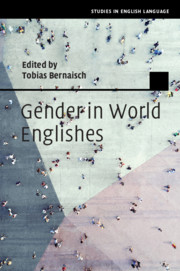Book contents
- Gender in World Englishes
- Studies in English Language
- Gender in World Englishes
- Copyright page
- Dedication
- Contents
- Figures
- Tables
- Contributors
- Chapter 1 Introduction
- Chapter 2 Localisation, Globalisation and Gender in Discourse-Pragmatic Variation in Ghanaian English
- Chapter 3 Sociolinguistic Variation in Intensifier Usage in Indian and British English
- Chapter 4 Tag Questions and Gender in Indian English
- Chapter 5 Hedges and Gender in the Inner and Expanding Circle
- Chapter 6 The Role of Gender in Postcolonial Syntactic Choice-Making
- Chapter 7 Social Constraints on Syntactic Variation
- Chapter 8 Linguistic Colloquialisation, Democratisation and Gender in Asian Englishes
- Chapter 9 Gender, Writing and Editing in South African Englishes
- Index
- References
Chapter 9 - Gender, Writing and Editing in South African Englishes
A Case Study of the Genitive Alternation
Published online by Cambridge University Press: 11 December 2020
- Gender in World Englishes
- Studies in English Language
- Gender in World Englishes
- Copyright page
- Dedication
- Contents
- Figures
- Tables
- Contributors
- Chapter 1 Introduction
- Chapter 2 Localisation, Globalisation and Gender in Discourse-Pragmatic Variation in Ghanaian English
- Chapter 3 Sociolinguistic Variation in Intensifier Usage in Indian and British English
- Chapter 4 Tag Questions and Gender in Indian English
- Chapter 5 Hedges and Gender in the Inner and Expanding Circle
- Chapter 6 The Role of Gender in Postcolonial Syntactic Choice-Making
- Chapter 7 Social Constraints on Syntactic Variation
- Chapter 8 Linguistic Colloquialisation, Democratisation and Gender in Asian Englishes
- Chapter 9 Gender, Writing and Editing in South African Englishes
- Index
- References
Summary
This chapter investigates the intersection between gender, writing and editing of published written texts and endonormativity in South African English. We focus on three sub-varieties within the South African context: two indigenous strands, Afrikaans English (AfrE) and Black South African English (BSAfE), and the settler strand, White South African English (WSAfE). We use multifactorial methods to analyse the effects of gender amongst a set of linguistic and extra-linguistic variables conditioning the genitive alternation across unedited and edited texts produced by AfrE, BSAfE and WSAfE authors. The results show that gender plays a minor role in conditioning the genitive alternation for both authors and editors, demonstrating that the genitive choices of men and women are conditioned in similar ways. As expected, linguistic factors play the greatest role in conditioning the genitive alternation. Our findings confirm recent investigations into cross-varietal and register differences and show that while the direction of the effect of linguistic factors is the same across sub-varieties and registers, the strength of these factors differs in certain sub-varieties and registers. Our findings also confirm recent findings regarding the genitive alternation in second-language varieties and suggest a possible substrate transfer effect, in especially BSAfE writing. Although editorial intervention introduces subtle shifts in preferences for the two constructions, this intervention mostly reinforces the choices of authors.
Keywords
- Type
- Chapter
- Information
- Gender in World Englishes , pp. 205 - 232Publisher: Cambridge University PressPrint publication year: 2021

